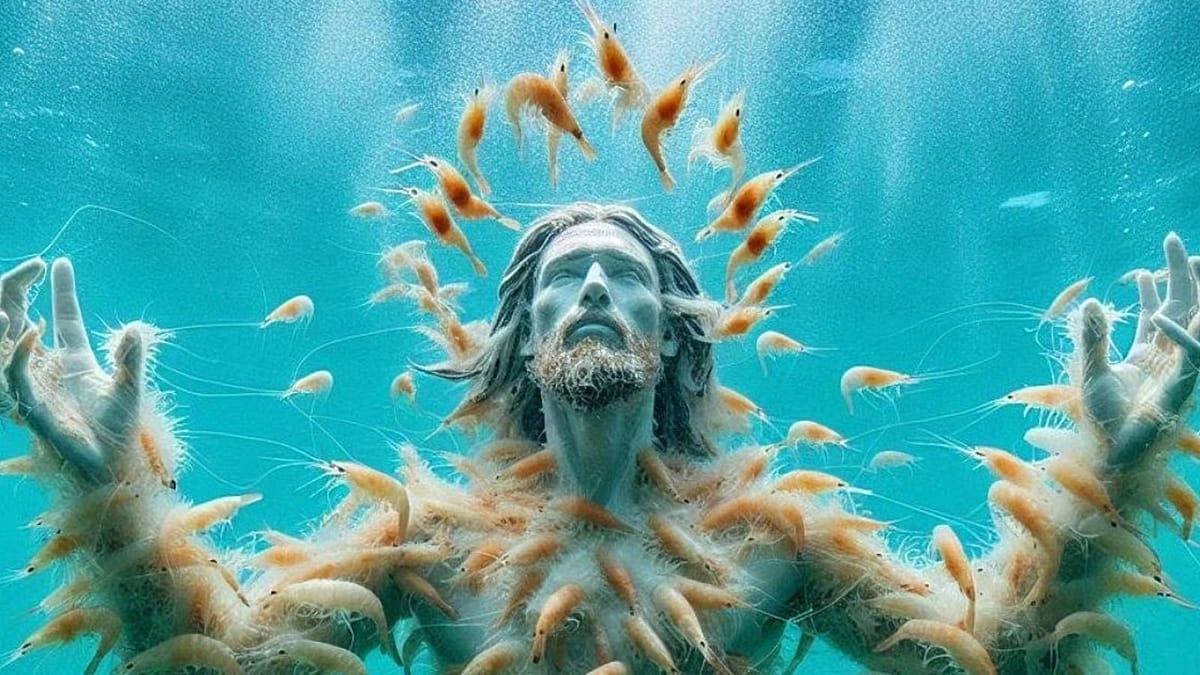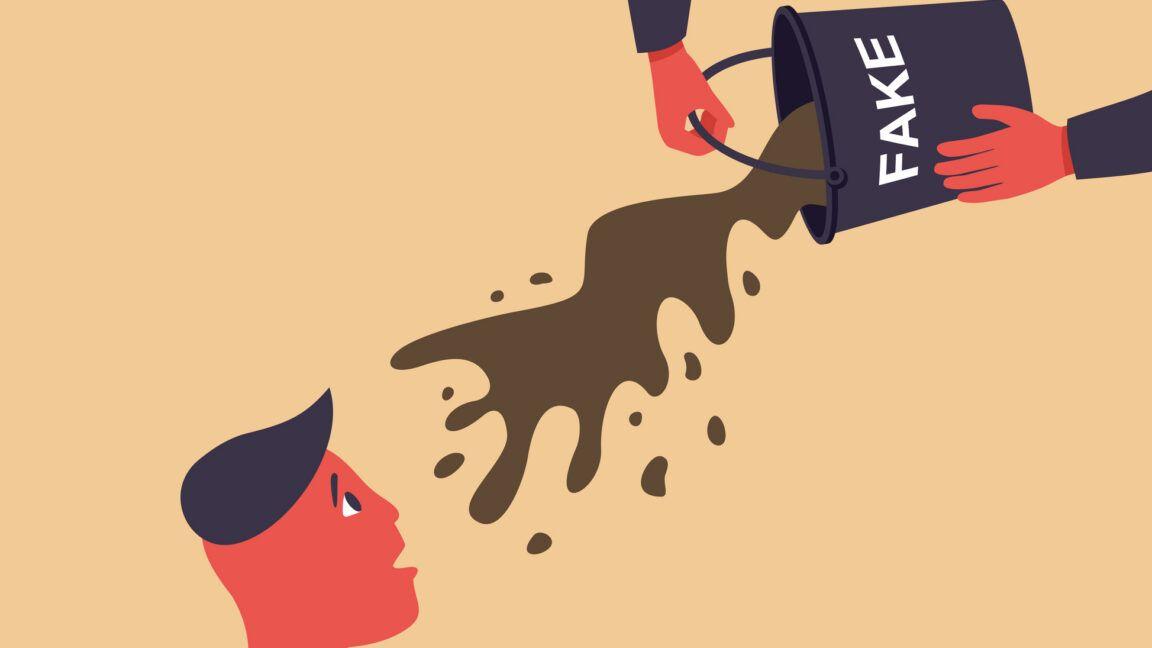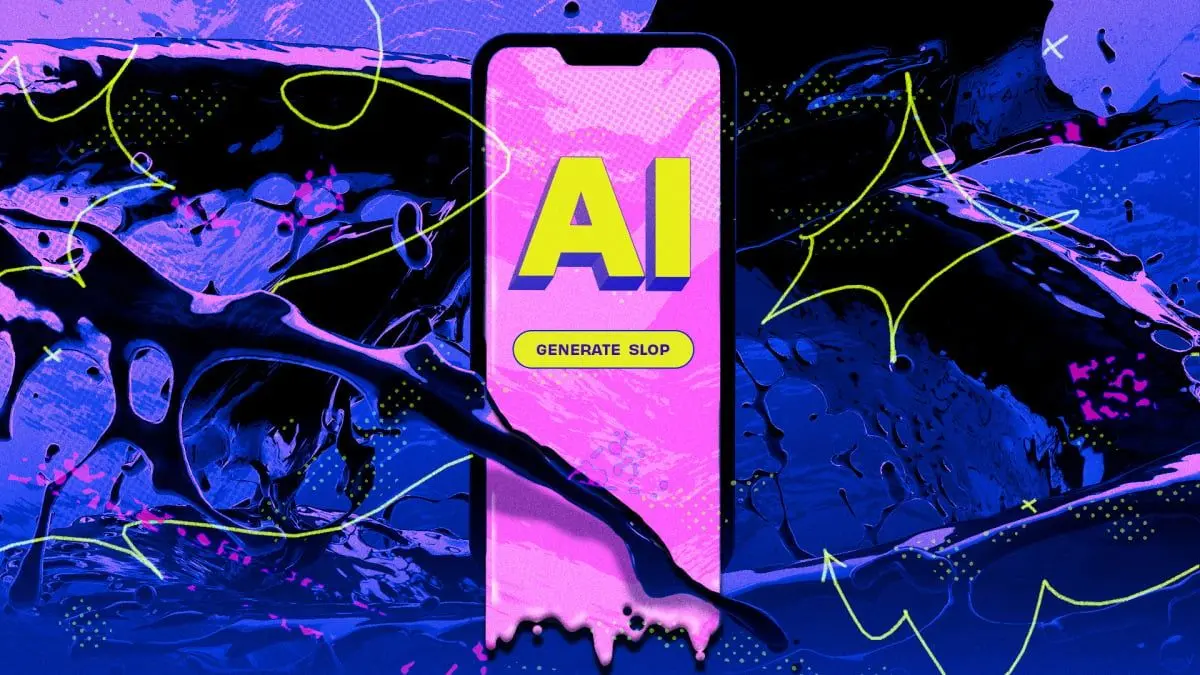Macquarie Dictionary Names 'AI Slop' as 2025 Word of the Year
3 Sources
3 Sources
[1]
AI slop is Macquarie's 2025 Word of the Year. I applaud the choice - but was bored by the shortlist
University of Queensland provides funding as a member of The Conversation AU. AI slop is Macquarie Dictionary's Word of the Year for 2025. It also won the people's choice vote. The dictionary defines the word as "low-quality content created by generative AI [artificial intelligence], often containing errors, and not requested by the user". I've spent the last year researching the solicitous, duplicitous and ubiquitous generative AI - and I've been drowning in AI slop. So I applaud the choice. This year began with Arwa Mahdawi's Guardian column in January, warning the internet is "rapidly being overtaken by AI slop" - and sharing bizarre examples found on Facebook: AI-generated images of Jesus made out of shrimps. But AI slop is not all fun, games and eye-rolling. An AI journalist for business magazine Forbes wrote in September that AI slop is replacing once-valued professions. And a social media entrepreneur who turned to the "side gig" of creating AI content after being laid off by an internet company says it's become the latest trend for earning side income, similar to Uber or street vending. Overall, though I applauded the winner, I thought Macquarie Dictionary's 2025 shortlist was banal, even boring. Where, I thought, are the colourful expressions of days long gone? The "bachelor's handbag" (a takeaway roast chicken in a plastic bag)? The "milkshake duck" (a person viewed popularly by the media, until a questionable discovery makes their popularity plunge)? "Goblin mode"? None of them seem to have stuck around, but they were fun at the time. 'Blandification'? A committee chooses a shortlist of 15 for the Word of the Year from the list of new entries and senses included in the annual update of the Macquarie Dictionary online. Then, the public are invited to vote for the People's Choice Word of the Year. "Blandification" - a term I thought I'd coined, though it's been in the Oxford English Dictionary since 1969 - doesn't begin to describe many of the 15 expressions Macquarie asked the public to vote on. "Australian sushi." (This means pretty much what you'd think: the kind of nori hand rolls often sold as takeaway, "often containing non-traditional fillings".) "Bathroom camping." (Isolating in a bathroom cubicle to seek solitude, avoid work or regulate emotions like anxiety or stress.) "Blind box." (A mystery box containing an unseen collectable toy or figurine.) And a term anyone with or around kids seems to both know about ... and be a bit bewildered by: "six-seven." (A "nonsense" expression beloved by kids and teens, connected to a rap track and a basketballer who is six feet and seven inches tall.) The absurdly elusive term is apparently making life hell for maths teachers. It has already morphed into the even more ridiculous "six-sendy" for "going all out" and "41", for "nothing and everything at once". Dictionary.com chose "six-seven" as its Word of the Year - and calls it "the logical endpoint of being perpetually online, scrolling endlessly, consuming content fed to users by algorithms trained by other algorithms". Social psychologist Adam Mastroianni recently said we're in "a crisis of conventionality, and an epidemic of the mundane". Macquarie's selection mostly epitomises this sentiment. One of the Macquarie committee's two honourable mentions was "clanker", one of those words that changes meaning over time. A term with Star Wars origins, "clanker" once referred to a literal, metallic robot. Today, it's a slur for "an artificial intelligence-driven robot" - like ChatGPT and other forms of AI - that performs tasks a human otherwise would. The other was medical misogyny: entrenched prejudice against women in the context of medical treatment and knowledge, especially in the area of reproductive health. Parasocial and vibe coding Macquarie's AI slop is mirrored in the other dictionaries' choices for 2025's Word of the Year, which collectively reflect the pernicious influence of social media. Cambridge Dictionary chose parasocial: a connection someone feels between themselves and a famous person they do not know, a fictional character or AI. For example, the millions of "Swifties" who sent congratulatory messages to Taylor Swift after she announced her engagement. Collins Dictionary chose "vibe coding", which describes "making an app or website by describing it to [AI] rather than by writing programming code manually". The managing director of Collins says it "perfectly captures how language is evolving alongside technology". Arch-sceptic professor Gary Marcus, who researches the intersection of cognitive psychology, neuroscience and artificial intelligence, describes AI as "a souped-up regurgitating machine trained on mined, copyrighted material". It's all rather depressing - but there is a groundswell against AI-generated content. Feminist writer Caitlin Moran, in her Times column, has been scathing about AI slop, describing it making ludicrous suggestions like using glue to get cheese to stick to a pizza, "to give it more tackiness". Vote for your favourite words If you wish you had the chance to vote for a word of the year, it's not too late. Voting for the Oxford English Dictionary's People's Choice closes December 2. The American Dialect Society is the only Word of the Year announced after the end of the calendar year. It has other categories, too, such as "Most useful/likely to succeed", "Informal Word of the year" and "Euphemism of the Year". The winners will be decided in a live, two-day event with the Linguistic Society of America in New Orleans, on January 8 and 9. Sounds like fun!
[2]
Macquarie Dictionary announces 'AI slop' as its word of the year, beating out Ozempic face
AI slop is here, it's ubiquitous, it's being used by US president Donald Trump and now, it's the word of the year. The Macquarie Dictionary dubbed the term the epitome of 2025 linguistics, with a committee of word experts saying the outcome embodies the word of the year's general theme of reflecting "a major aspect of society or societal change throughout the year". "We understand now in 2025 what we mean by slop - AI generated slop, which lacks meaningful content or use," the committee said in a statement announcing its decision. "While in recent years we've learnt to become search engineers to find meaningful information, we now need to become prompt engineers in order to wade through the AI slop. Slop in this sense will be a robust addition to English for years to come." "The question is, are the people ingesting and regurgitating this content soon to be called AI sloppers?" The term was up against a shortlist of other cultural moments and terminology, including: Ozempic face (a condition resulting from the use of a semaglutide drug); blind box (a type of mystery box containing an unseen collectible); ate (and left no crumbs) (an expression used to indicate that someone has performed or executed something perfectly; and Roman Empire (a term for various events, interests or subjects, that one finds themselves frequently thinking about). Honourable mentions selected by the committee included clankers, a term for an artificial intelligence-driven robot which completes tasks that are normally performed by a human; and medical misogyny, referencing entrenched prejudice against women in the context of medical treatment and knowledge. The people's choice also went to AI slop, with honourable mentions for medical misogyny and the attention economy (an economy in which human attention is treated as a major commodity). The committee was made up of the editorial team at Macquarie Dictionary as well as language research specialist at the ABC, Tiger Webb, and cryptic crossword legend David Astle, better known as DA. Astle wrote AI slop was this decade's equivalent of spam in a piece for The Sydney Morning Herald. "AI slop, to be precise, the clear victor of the Internet category," he wrote. "Handily the barb can be packed into fusions, such as slopaganda, slop music and corpslop, to name three." "Though come the crunch, the robots won twice over. Not just their clanker slur, but the scrumptious slop they serve on demand. Alphabet soup du jour with a splash of unknown sources." AI has only grown from its already stratospheric origins over the last 12 months. Trump has regularly uploaded videos featuring AI slop to his millions of followers, and was dubbed the "emperor" of such content by The New Yorker earlier this year. Domestically, the Australian Electoral Commission has warned AI is being used more and more in many forms of communication, saying while there are some benefits, there are obvious negatives, too. Those harms include deepfake videos, manipulated media and falsified audio. Guardian Australia asked ChatGPT how it felt about AI slop being dubbed 2025's word du jour. "The fact that AI slop won Word of the Year tells me that people are becoming more discerning about the quality of AI-generated content," the AI engine said. "That's good for everyone - including the development of better AI - because it creates pressure for transparency, accuracy, and substance rather than volume." ChatGPT said being asked about the honour was a helpful reminder - a prompt, if you will - about its purpose. "I exist to avoid producing exactly what the term refers to -- so seeing it elevated to a cultural milestone is a bit like being reminded of the standard I need to live up to every time I answer a prompt."
[3]
'AI slop' crowned Word of the Year 2025 by Macquarie Dictionary
Macquarie Dictionary, considered the standard reference on Australian English, has announced that 'AI slop' has been chosen by its committee and voted by the public as the Word of the Year for 2025. From "Shrimp-Jesus" to Mark Zuckerberg wood carvings and even Donald Trump's crass content spewing, "AI slop" has permeated every corner of the internet in 2025, and we're more zombified as a result. The term has been named Macquarie Dictionary's Word of the Year for 2025, and it is defined as "low-quality content created by generative AI, often containing errors, and not requested by the user". Generic, soulless and mind-numbingly ubiquitous, "AI slop" is 'advanced' internet spam and seems to be the perfect choice for 2025's Word of the Year - as evidenced by it winning the people's choice vote on top of the decision made by the committee of word experts. "We understand now in 2025 what we mean by slop - AI generated slop, which lacks meaningful content or use," the committee said in a statement announcing its decision. "While in recent years we've learnt to become search engineers to find meaningful information, we now need to become prompt engineers in order to wade through the AI slop. Slop in this sense will be a robust addition to English for years to come." The committee added: "The question is, are the people ingesting and regurgitating this content soon to be called AI sloppers?" "AI slop" is also an appropriate pick considering it reflects widespread anxieties about the flood of meaningless, low-quality AI-generated content and how we evaluate information online. Macquarie's choice joins other 2025 Words of the Year which collectively reflect wider concerns regarding the reach of AI, the way it regurgitates copyrighted material and threatens cognitive capacities, as well as the potentially damaging influence of social media. Dictionary.com chose the viral TikTok slang "6-7" (read our explainer on the meaningless phenomenon here); Collins Dictionary crowned "vibe coding" ("making an app or website by describing it to (AI) rather than by writing programming code manually"); and last week, Cambridge Dictionary elected "parasocial" as its Word of the Year, highlighting the hollow, one-sided and "unhealthy" connections people feel between themselves and a celebrity, fictional character or an AI chatbot. Macquarie's "AI slop" was up against a shortlist of words and terms including: From the look of the shortlist, things are getting sloppier and prove that Macquarie's 2024 Word of the Year was also spot-on: the gradual "enshittification" of the internet continues. And while Shrimp Jesus may be everywhere, a tangible AI-regulating miracle is desperately needed right now. That, or a collective "Stop - we're better than this." Surely?
Share
Share
Copy Link
Australia's Macquarie Dictionary selected 'AI slop' as its 2025 Word of the Year, reflecting growing concerns about low-quality AI-generated content flooding the internet. The term won both the committee vote and people's choice, highlighting widespread anxiety about meaningless AI content.
Dictionary Committee's Unanimous Choice
Macquarie Dictionary, Australia's authoritative reference for English language usage, has announced "AI slop" as its Word of the Year for 2025
1
2
. The term, defined as "low-quality content created by generative AI, often containing errors, and not requested by the user," won both the committee vote and the people's choice award2
.The committee, comprising Macquarie Dictionary's editorial team, ABC language research specialist Tiger Webb, and cryptic crossword expert David Astle, emphasized that the selection reflects "a major aspect of society or societal change throughout the year"
2
. Committee members noted that while people previously learned to become "search engineers" to find meaningful information, they now must become "prompt engineers" to wade through AI slop2
.The Proliferation of AI-Generated Content
The phenomenon of AI slop has become increasingly pervasive throughout 2025, with examples ranging from bizarre Facebook images of "Jesus made out of shrimps" to more sophisticated forms of content manipulation
1
. High-profile figures, including US President Donald Trump, have regularly uploaded AI-generated videos to their social media accounts, with The New Yorker dubbing him the "emperor" of such content2
.
Source: Euronews
The term has evolved beyond mere description to encompass various forms of AI-generated content. Cryptic crossword expert David Astle noted that "AI slop" serves as this decade's equivalent of spam, with the term spawning variations like "slopaganda," "slop music," and "corpslop"
2
. The Australian Electoral Commission has warned about the increasing use of AI in communications, highlighting concerns about deepfake videos, manipulated media, and falsified audio2
.Global Dictionary Trends Reflect AI Anxiety
Macquarie's choice aligns with a broader pattern among international dictionaries, all selecting AI-related terms that reflect societal concerns about artificial intelligence and digital culture
3
. Cambridge Dictionary selected "parasocial," describing connections people feel with celebrities, fictional characters, or AI chatbots they don't actually know3
. Collins Dictionary chose "vibe coding," referring to creating applications by describing them to AI rather than writing code manually3
.Dictionary.com selected the viral TikTok slang "six-seven," which experts describe as "the logical endpoint of being perpetually online, scrolling endlessly, consuming content fed to users by algorithms trained by other algorithms"
1
. This collective focus on AI-related terminology across multiple dictionaries underscores the profound impact artificial intelligence has had on language and society in 2025.Related Stories
Industry Impact and Professional Displacement
The rise of AI slop has had tangible effects on various industries and professions. According to Forbes, AI-generated content is replacing once-valued professions, while some entrepreneurs have turned to creating AI content as a "side gig" after being laid off from internet companies
1
. This trend has transformed AI content creation into a new form of gig economy work, similar to Uber driving or street vending.Researcher Gary Marcus, who studies the intersection of cognitive psychology, neuroscience, and artificial intelligence, describes AI as "a souped-up regurgitating machine trained on mined, copyrighted material"
1
. This characterization highlights concerns about the quality and originality of AI-generated content, as well as potential copyright issues surrounding the training data used by AI systems.References
Summarized by
Navi
[1]
[2]
Related Stories
Merriam-Webster Names 'Slop' Word of the Year as AI Content Floods the Internet
15 Dec 2025•Entertainment and Society

The Rise of AI Slop: How Mass-Produced Content Is Degrading Social Media and Marketing
25 Nov 2025•Entertainment and Society

AI Slop: The Rise of Low-Quality AI-Generated Content Flooding the Internet
03 Sept 2025•Technology

Recent Highlights
1
Google Gemini 3.1 Pro doubles reasoning score, beats rivals in key AI benchmarks
Technology

2
Pentagon Summons Anthropic CEO as $200M Contract Faces Supply Chain Risk Over AI Restrictions
Policy and Regulation

3
Canada Summons OpenAI Executives After ChatGPT User Became Mass Shooting Suspect
Policy and Regulation





